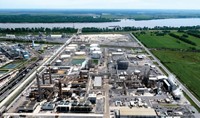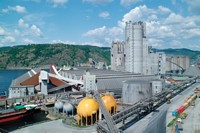Advertisement
Grab your lab coat. Let's get started
Welcome!
Welcome!
Create an account below to get 6 C&EN articles per month, receive newsletters and more - all free.
It seems this is your first time logging in online. Please enter the following information to continue.
As an ACS member you automatically get access to this site. All we need is few more details to create your reading experience.
Not you? Sign in with a different account.
Not you? Sign in with a different account.
ERROR 1
ERROR 1
ERROR 2
ERROR 2
ERROR 2
ERROR 2
ERROR 2
Password and Confirm password must match.
If you have an ACS member number, please enter it here so we can link this account to your membership. (optional)
ERROR 2
ACS values your privacy. By submitting your information, you are gaining access to C&EN and subscribing to our weekly newsletter. We use the information you provide to make your reading experience better, and we will never sell your data to third party members.
Economy
Russia gains by turning natural gas into urea
The country is successfully using chemistry to avoid European sanctions
by Alex Scott
May 2, 2024
| A version of this story appeared in
Volume 102, Issue 14

For the past 2 years, sanctions on sales of Russian natural gas have caused high energy prices in Europe, to the detriment of makers of chemicals, fertilizers, and other energy-intensive goods.
Russia is now compounding the problem for fertilizer producers by converting the gas into urea, which is exempt from sanctions, and exporting it instead. The practice is substantial and is distorting the European Union urea market, according to the Norwegian fertilizer producer Yara.
“Fertilizer is the new gas,” Svein Tore Holsether, Yara’s CEO, said in a presentation to journalists. “Russian urea imports to Europe reached an all-time high last season and currently account for almost one-third of total urea imports to the EU. While raw material sanctions and price pressure is taking a double toll on European industry, Russia is gaining market influence. That not only endangers European industry and the green transition, but it also makes European food production more vulnerable.”
Making urea from natural gas involves a number of chemical steps. First, hydrogen is separated from methane and combined with nitrogen from air to form ammonia using the Haber-Bosch process. Subsequently, ammonia and carbon dioxide are combined in an exothermic reaction to form carbamate salt, which is heated to create urea.
Data from Eurostat, the European Commission’s statistics agency show that Russian imports of urea into the EU rose from 1.1 million metric tons (t) in 2021 to more than 1.5 million t in both 2022 and 2023.
The EU has attempted to sanction some Russia-connected fertilizer producers, including EuroChem, a company formerly owned by the Russian industrialist Andrey Melnichenko.
A number of European urea and ammonia producers have closed or slowed plants because of high natural gas prices. For example, in 2022, CF Industries shut its ammonia plant in Billingham, England, and BASF and Yara cut ammonia production. High gas prices continue to be a problem for the German chemical sector, according to Verband der Chemischen Industrie, a trade group.




Join the conversation
Contact the reporter
Submit a Letter to the Editor for publication
Engage with us on Twitter